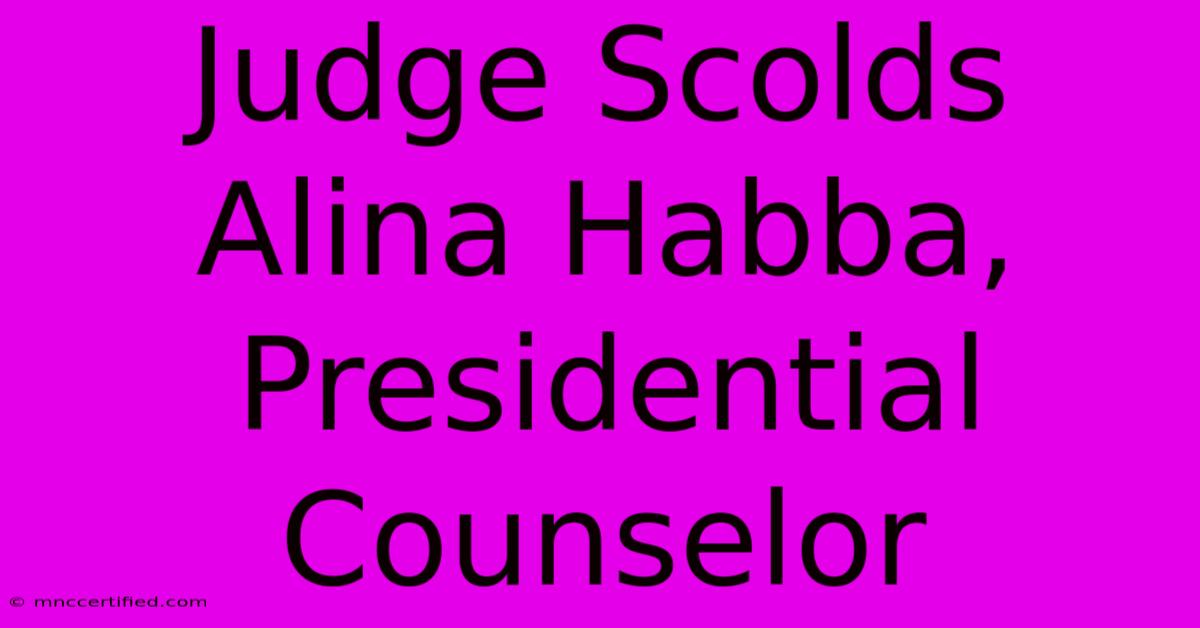Judge Scolds Alina Habba, Presidential Counselor

Table of Contents
Judge Scolds Alina Habba, Presidential Counselor: A Deep Dive into the Legal Fallout
Alina Habba, a prominent attorney and counselor to former President Donald Trump, recently faced sharp criticism from a judge during a court hearing. This event has sparked significant media attention and raised questions about her legal strategies and professional conduct. This article delves into the details of the incident, exploring its implications and providing context to the ongoing legal battles surrounding the former president.
The Judge's Rebuke: What Happened in Court?
The specific details of the judge's rebuke may vary depending on the source, but the core issue revolves around Habba's handling of a case. Reports indicate the judge expressed strong disapproval of her conduct, using words like "frivolous," "baseless," and even "outrageous" to describe aspects of her legal arguments or actions. The exact nature of the accusations varies across news outlets, but the consistent thread is the judge's visible frustration and disapproval of Habba's performance. It’s crucial to consult multiple credible news sources for a comprehensive understanding of the events. This isn't about simply reporting the what but understanding the why.
The Underlying Legal Case: Setting the Stage
Understanding the judge's reaction requires grasping the broader legal context. The case in question likely involves allegations against [mention the specific case, e.g., the former President or a related entity]. The judge's sharp words suggest the arguments presented by Habba were deemed insufficient, potentially lacking evidence or based on weak legal grounds. The details of this underlying case are paramount to understanding the severity of the judge's reprimand. Analyzing news reports, court documents (if publicly available), and legal expert opinions provides a clearer picture of the situation.
Implications and Analysis: Beyond the Headlines
This public scolding carries significant consequences for Habba and, by extension, her client. The judge's harsh words damage Habba's professional reputation and credibility within the legal community. It raises questions about her legal strategy, suggesting a potential lack of preparation or a disregard for established legal procedures. Such instances can impact her ability to effectively represent clients in future cases.
Impact on Trump's Legal Strategy
The incident also casts a shadow on the former President's legal team and their overall approach to ongoing litigations. The judge's negative assessment of Habba's performance might influence the court's perception of other related cases. It raises concerns about the effectiveness and reliability of the legal strategy employed by Trump's legal counsel.
The Role of Media Coverage and Public Perception
The widespread media coverage significantly influences public perception. The narrative around this event is crucial, impacting how the public views both Habba and Trump's legal battles. Responsible media consumption and analysis of various perspectives become essential in forming an informed opinion.
Looking Ahead: Future Legal Challenges
This incident highlights the importance of meticulous legal preparation and adherence to ethical conduct within the courtroom. The future of the involved cases remains uncertain, but the judge's rebuke serves as a stark warning about the potential consequences of inadequate legal representation. For Habba, it necessitates a careful review of her strategies and a renewed focus on professional conduct. The case underscores the high stakes of legal battles involving public figures and the intense scrutiny that follows.
SEO Keywords:
- Alina Habba
- Donald Trump
- Presidential Counselor
- Legal battle
- Judge's rebuke
- Court hearing
- Frivolous lawsuit
- Legal strategy
- Professional conduct
- Media coverage
- Public perception
Note: This article is for informational purposes only and does not constitute legal advice. Always consult with a qualified legal professional for advice on any specific legal matter. The information provided here is based on publicly available reports and should be corroborated with additional sources for a complete understanding.

Thank you for visiting our website wich cover about Judge Scolds Alina Habba, Presidential Counselor. We hope the information provided has been useful to you. Feel free to contact us if you have any questions or need further assistance. See you next time and dont miss to bookmark.
Featured Posts
-
Update United Healthcare Ceo Shooting Case
Dec 10, 2024
-
Auto Insurance Opelika Al
Dec 10, 2024
-
New 28 Years Later Trailer Johnson Comer Lead
Dec 10, 2024
-
Subaru Brz Insurance Cost
Dec 10, 2024
-
Life Insurance Seattle Wa
Dec 10, 2024